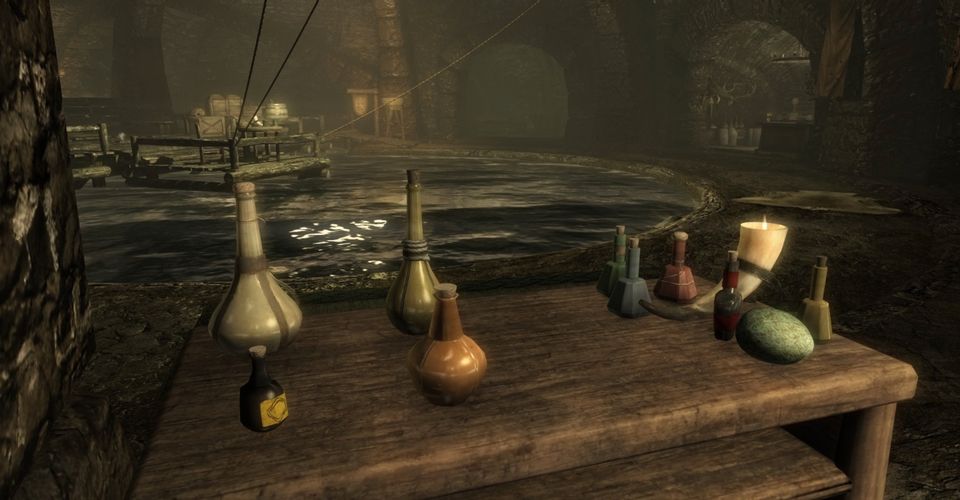Skyrim: Pros & Cons Of Leveling Alchemy Skill Tree

Alchemy is a skill tree that can benefit every build in The Elder Scrolls V: Skyrim, but the leveling and crafting required to make the most of it, means many players end up ignoring Alchemy entirely. Every skill in Skyrim has its respective brewable potion that can be used to fortify and enhance it to higher levels. Any player looking to fully maximize their damage output, defense, or their utility, in general, must include Alchemy both in and out of combat.
Alchemy, just like Smithing, suffers the same pros and cons of all Skyrim’s crafting trees. Putting the skill into practice takes patience, resources, gold, and frequent inventory management. On the plus side, ingredients are largely easy to come by. Flowers, fungi, berries, roots, and harvestable animal resources are encountered every few seconds of exploring Skyrim’s caves and wilds. Alchemy Tables are common as well, and Alchemist’s shops are readily available in every city except for Winterhold.
Using an Alchemy Table and actually brewing potions and poisons is a different story. There is an overwhelming amount of menu scrolling involved, and an underwhelming presentation of the minigame’s interface. Players can select 2-3 components with unknown effects, combining them together into a potion or poison. This ideally leads to discovering new ingredient properties, but many combinations produce no result, simply wasting resources.
Leveling Skyrim’s Alchemy Skill Tree Has Pros and Cons

When those resources are Wheat or Tundra Cotton it’s not too bad, but failing to make a meaningful concoction using Skyrim’s best Alchemy ingredients can be a frustrating waste of rare items. The biggest shortcoming with this design is that the amount of experience earned from brewing a potion is proportional to its gold value. While this makes sense, it means that any failed mixtures will not raise Alchemy levels at all. Failure is a valuable teacher, but since it doesn’t reward XP in this case, players are not incentivized to experiment with their rare ingredients. The rarity of Giant’s Toe, Briar Heart, or Void Salts implies that they are more powerful, but experimenting with them risks losing the resource for zero gain.
The Smithing and Enchanting skills, by comparison, have less strict fail states. With the right materials, forging an iron helmet cannot fail. Crafting potions, however, can. This is where the Alchemy Skill tree tries to make up the difference. Unfortunately, most of the perks in Skyrim’s Alchemy tree are not worth the investment. Considering their effects and the way that Alchemy is presented in Skyrim, these perks would more logically unlock in their reverse order.
The first Alchemy perks the player will have access to are Alchemist, Physician, and Benefactor. Each of these serves to bolster the magnitude of brewed potions, furthering their damage and raising their bonuses. It isn’t until the higher Alchemy skill levels of 50, 70, and even 90 that perks like Experimenter and Green Thumb can be chosen. These perks reveal additional ingredient effects and double the amount gathered when harvesting, respectively. While definitely useful, both perks would be far more valuable early in the game when the player doesn’t know what the ingredients are. By the time they’ve reached level 90 in such a grind-based skill, there won’t be many more ingredient effects left for them to discover, making Experimenter far less useful.
While there’s little reason to get the skill up to level 100, Alchemy can still enhance Skyrim’s strongest builds. Fortify Destruction potions, for example, are one of the few ways mages can directly increase their damage output. Potions to Fortify Pickpocket make all the difference when stealing difficult items from wary NPCs. Fortify One-Handed increases the raw damage dealt with one-handed weapons – regardless of their quality or the player’s skill in that tree.
Putting points into Alchemy is a one-stop shop for any path the player wants to take. Carrying around expertly crafted potions to suit any occasion is theoretically a more cost-efficient use of perks: It’s better to spend perk points here than have to decide between One-Handed and Two-Handed, or between Heavy Armor versus Light Armor; Alchemy affects both in equal measure. Similarly, poisons can be applied to weapons of all types, from daggers and bows, to axes and greatswords. Slipping poison into an NPC’s pocket with the Poisoned perk in the Pickpocket tree adds variety and options to a Dark Brotherhood playthrough.
As with the Alchemy Table, Skyrim’s UI is a major detractor from putting this concept into motion. Applying a poison requires equipping a weapon, opening the menu screen, navigating to Potions, then scrolling down to select the desired poison. Unless the player has 60 levels in Alchemy, and has invested in the Concentrated Poison perk, they’ll have to go through all of that again each time they want to poison their weapon. Since many targets in Skyrim, particularly the ubiquitous Draugr, are resistant to poison anyway, it’s definitely not worth the lengthy process that it takes to apply it – especially mid-fight.
Use Skyrim’s Alchemy Skill To Make Brewed Potions Stronger

Which Perks To Choose
- Alchemist: Applying poisons to weapons is only worth it if they’ll deal significant damage. Likewise, brewing helpful potions is only worth the effort if they’re better than those on offer from merchants, or better than the ones found in dungeons. This perk does just that, offering a steady increase in usefulness (and in gold value) with each point spent on it. After five levels, brewed potions are 100% stronger than average.
- Benefactor: This perk is valid for the same reason as Alchemist. It’s more niche since it doesn’t affect poisons, but this stacks with Alchemist for potions with Fortify effects, leading to far stronger bonuses than are typical. This is particularly useful for crafting potions for Smithing and Enchanting, since they have far-reaching benefits.
- Poisoner: The flip side of Benefactor, this perk also stacks with Alchemist, but is only useful for poisons. Poisons are generally less effective than helpful potions. It’s not worth poisoning a bow for 1-2 hits when a Fortify Marksman potion lasts far longer, for example. Still, with this perk players can brew poisons that put the game’s default Deadly Poison or Lingering Damage Stamina vials to shame.
Which Perks Not To Choose
- Snakeblood: Poison does very little damage in Skyrim, both to enemies and to the player. By mid-game, most players can shrug off poison dart traps like they’re not even there, and fight Frostbite Spiders unfazed by their easily-dodged venom. Most Skyrim players also opt for either playing as a Werewolf or as a Vampire. Both are 100% immune to poison, completely obsoleting this perk’s 50% resistance.
- Experimenter: Knowing an ingredient’s effects is moderately useful, but enough experimentation in front of an Alchemy Table reveals them over time anyway. By the time the player reaches the requisite level 50 to unlock the first of this perk’s three levels, they’ll likely have at least two effects figured out already – especially considering the amount of brewing needed to reach that level. Furthermore, it’s easy to find guides online that list all an ingredient’s effects.
- Physician: Restorative potions are easily found in every one of Skyrim’s dungeons, and they are already set to match the player’s level. Since a brewed potion – even with maximum Alchemy perks – cannot grant the same 100% health-back guarantee of an Ultimate Healing Potion, they are not worth brewing. When these are found in dungeons, however, they should be picked up. Ultimate restorative potions are something every Skyrim player should have on hand.
Skyrimis available on PC, PlayStation 3, Xbox 360, PlayStation 4, Xbox One, PlayStation 5, Xbox Series X/S, and Nintendo Switch.
About The Author

















